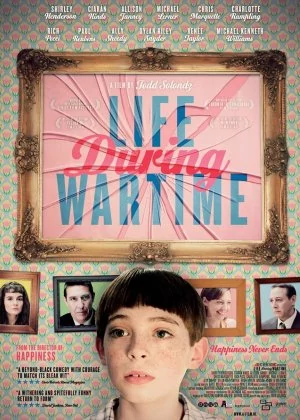Life During Wartime

Todd Solondz returns to the silver screen with a semi-sequel to Happiness and Storytelling, two films that are often regarded as modern classics. But the reception for his latest film was rather lukewarm, and even that's overstating it a little. There was a slight buzz when Life During Wartime was announced in 2007, but by the time it found a definite release most people seemed to have forgotten about it entirely. I too plead guilty, but I'm going to make it up to Todd.

Solondz is the king of awkward. That said, he is also somewhat of a one-trick pony so maybe that's why Life During Wartime quickly faded into obscurity. To make matters worse, Life During Wartime is rather big on referencing his earlier works, making it not very suitable to welcome newcomers into the Solondz universe. But as a warm-hearted Solondz fan I can only welcome his latest film with open arms. I don't mind that Solondz keeps revisiting the same themes and characters as there really isn't anyone out there who manages to explore the fragile balance between snide, crude, insensitive humor and the warm, humanistic love felt for the film's cast.
See, it's okay to laugh with Solondz' characters. They are losers, they may have some physical defects (or at least, look a little strange), sometimes they are just plain creepy and perverse, but as an audience we grow to love them like we love our dearest friends. We can laugh at their misadventures and mistakes because there is a bond of trust between the audience and the characters, ensuring that whatever they might have done wrong, or whatever defects they have, we can live with that. There is no other director that manages to balance these opposing emotions like Solondz can.
Life During Wartime starts when Bill, the pedophile from Happiness, is released from prison. His sons are made to believe he's dead but he decides to seek them out anyway. At the same time, Joy is experiencing serious trouble in her marriages and decides she needs some time off from her husband, moving back to Florida where the rest of her family resides. The film doesn't really work up to a climax from there on, rather it follows a particular period in the character's lives.

Visually this is a serious step up from Solondz' earlier works. Almost every scene is dipped in strong, powerful colors that immediately sculpt the atmosphere of the scene. The film feels more idealistic, almost fairytale-like in some part, which makes it a little easier to go along with the strange conversations and awkward characters. Great camera work, aptly editing and simply very enjoyable to look at.
The soundtrack quite nice too. Rather simple, a little frivolous but generally classy. Safe one funny bit featuring an electronic dance version of Hava Nagila Solondz picks an elegant and consistent score that goes very well with the mood of the film. It stays away from overly dramatic tension to keep the lighthearted spirit of the film alive, keeping in tune with the fairytale-like approach of the film.
Acting in Solondz' films is always strong, Life During Wartime is no exception. It must be said that the acting here is a little less life-like, as the conversation and actions are getting stranger and more abstract with every new film, but that only adds to the fun. Actors are chosen as much for their acting qualities as for their distinguishable features, creating a very interesting and varied blend or actors/characters. Most notable addition to the cast: Paul Reubens. Never ever dreamed of seeing him in a Solondz film, but boy did that turn out well.

The pacing might be a little slow and the film relies heavily on his previous films, which makes Life During Wartime a little less accessible that it should be, but fans of Solondz shouldn't worry. Ultimately this film works even without seeing his previous films, just know that you're missing out on a few running gags. Apart from that, Life During Wartime is a logical continuation of Solondz trademark style, so if you didn't like his earlier films you're bound to dislike this one too.
I would advise against making this the first Solondz film you watch, just try Happiness or Storytelling first as these films are a bit more accessible. If on the other hand you feel confident enough to tackle this Solondz there's little to be disappointed about. His trademark style is very much intact and the film received a big audiovisual boost, making it one of the best films he's made yet. As a Solondz fan, I can only hope he'll keep making 'em like this.